#strugatsky brothers
Text
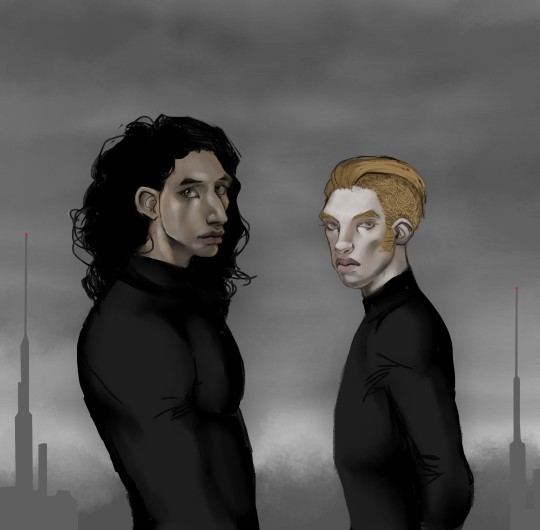
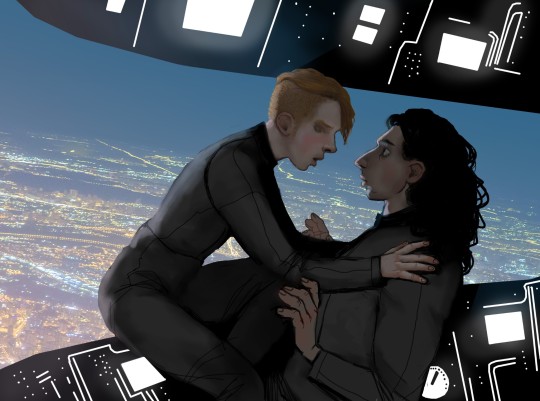
The Inhabited Island
#star wars#my art#general hux#kylo ren#kylux#armitage hux#ben solo#The Inhabited Island#strugatsky brothers
113 notes
·
View notes
Text
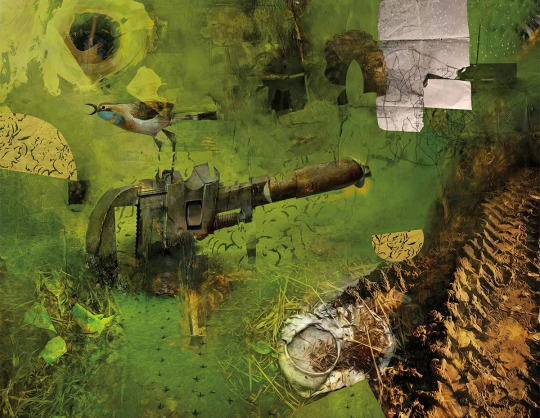
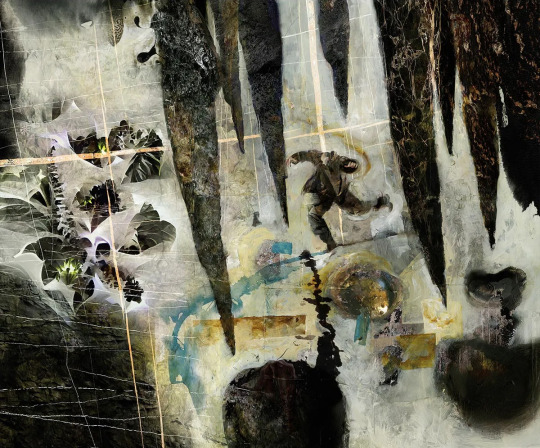
Dave McKean’s illustrations for Arkady & Boris Strugatsky‘s Roadside Picnic.
#dave mckean#arkady strugatsky#boris strugatsky#strugatsky brothers#russian literature#roadside picnic#stalker
170 notes
·
View notes
Photo
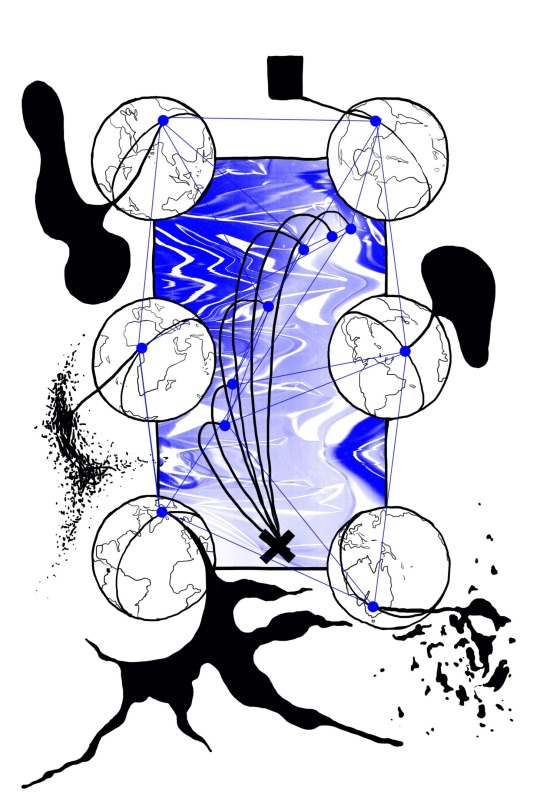

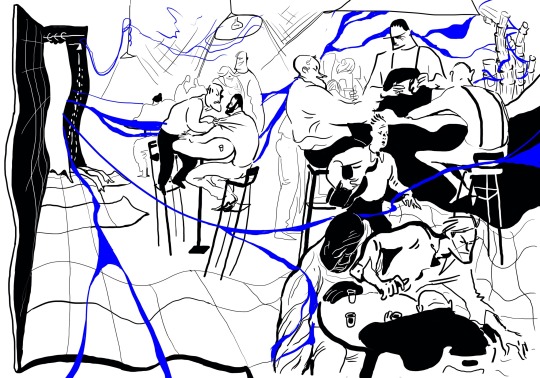



illustrations for "Roadside Picnic" by Arkady and Boris Strugatsky
196 notes
·
View notes
Text

Hard To Be a God (Chapter 4) literally be like
73 notes
·
View notes
Text
Book Review 29 - Roadside Picnic by Arkady and Boris Strugatsky
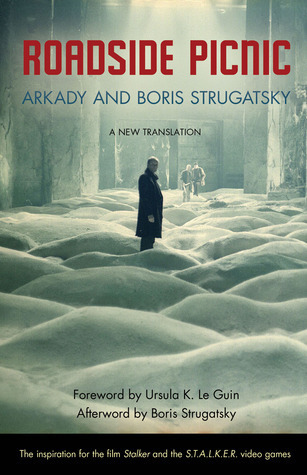
I very theoretically read a few of the Strugatsky Brothers’ short stories for a Soviet Lit class in school years ago, but this is actually the first one of their books I can say I actually read and, like, meaningfully paid attention to. I was likewise vaguely aware that this was a very influential book, but only in a kind of fuzzy ‘the STALKER games are based on it, right?’ sort of way.
All to say, I went in basically blind and was actually pretty pleasantly surprised. Both by the quality of the book and by the realization of how much more influential it has been than I had previously realized. The afterwards by one of the authors for the new edition with the tell-all rant about the publication process was also just fascinating in an entirely different way.
The story takes place in a world where at a certain point aliens made contact with earth – not with any sort of communication or even physical presence, but through some sort of process that left zones around the world warped and strange, full of physics-defying miracles and ten thousand different ways to die horribly or end up slowly mutated and wasting away. The story is set around a small town in probably-Canada that was one of the ground zeroes, and about Red, one of the freelance ‘stalkers’ who make a fortune evading the government quarantine and securing some of those physics-defying-miracles to sell to the highest bidder before the official scientists can slowly make their way to them.
Red does not have what you would call a happy life.
The story’s split into three sections, with significant time jumps between each one. Which I did rather like the effect of, seeing how the town changes from a half-abandoned ruin everyone thinks is a month away from demolition to a scientific boomtown and the long-term effects of exposure become more and more well known but don’t stop the rush to exploit the potential riches of the alien detritus one bit. It also allows for a better look at Red’s slow downward slide in both material circumstance and morality.
Red himself is interesting? He’s a very rough, brutish sort of man, the kind who jumps to threats of violence pretty easily when it comes to disputes where he thinks he’s in the right, who doesn’t have the temperament to hold down any sort of steady, boring job, and knows it, and who has a little bit of a complex about all those things. He tries to look out for his friends and comrades, and provide for his family, and that’s about the highest morality he aspires to. Hardly the most original archetype, but it’s very well-realized. No matter how viscerally unlikable he gets at points when you’re spending so long in the close confines of his head.
Speaking of complexes and guilt – one of his overriding motivations for the back 2/3 of the book is trying to provide for and cure his daughter who, almost certainly due to the weird alien radiation he’s saturated with, was born incredibly mutated (in a ‘has fur and is incapable of human speech’ sort of way). Which, again, kind of blunt instrument characterization but the book did do an excellent job getting across the constant low-level soul eating guilt and resentment that basically soaked through him about her and how that motivates just about every major choice he makes in the final act of the story.
And since I’m talking about characterization – look, I get that most of this is just the close POV to a guy whose a complete boor, but my god did the portrayal of women in this just make me roll my eyes. And I like to think I’ve usually got fairly thick skin for this sort of thing – but hard to ignore the fact that the literal only two women with recurring roles and more than a handful of lines are a) the loving, long-suffering but supportive wife who we basically only ever see in domestic scenes and b) the dissolute hot-but-dumb slutty daughter of the stalker equivalent of the local oligarch, y’know? And Red’s internal monologue and how they’re described did not exactly obscure the issue.
Tone-wise – I mean, look, this book is really not helping the stereotype about Russian novels. Which is not at all a problem for me personally, but there is as far as I can tell exactly one uncomplicated heroic devotee of truth and the common good. He dies at the end of part one, and the guilt over it is another load-bearing chunk of Red’s various complexes. It is overwhelmingly a book of flawed, broken, small-minded and selfish people, most of whom aren’t too found of each other. The very ending, with the wish for a better world quite literally hidden away behind a barrier that requires a human sacrifice to traverse, kind of emphasizes that.
The long timeskips and fairly compressed narration means that there’s only really a vague sketch of the wider world – of the corporations and conspiracies who buy what the stalkers sell, of the miracles that exploiting them has allowed, and of how things have improved and/or gone to shit generally – but it’s a really well done sketch. Then again, the ability to have the protagonist be a bit player in wider structures and to gesture at outside agencies with their own schemes that just don’t matter to the plot seems to have been a much more common skill among sci fi writers a couple generations ago. Still, the sort of retrofutristic noir world, powered by alien wonders that some technicians can use but absolutely no one can understand, is well done and appealing.
Speaking of – so this really is a cosmic horror story, and honestly a better one than most modern inheritors of Lovecraft. The universe is wondrous and deadly and strange, it will kill you or mutate you beyond recognition or make you richer than you’ve ever dreamed, but most of all it does not care. Everything from the title on down is used to reinforce that, and the trouble humanity has coming to terms with the idea that to the aliens who have so profoundly changed civilization, we’re literally irrelevant. The descriptions of the environment and the precautions taken to navigate it are – well, I don’t know if they’re just the oldest example of a preexisting body of tropes or the book actually came up with them, but if it’s the latter then I suddenly understand a lot of what influenced some of my favourite works of sci fi horror.
Not part of the story per se, but the copy my library had included both a forward by Le Guin (mostly a reprint of the review she wrote when it was first translated to English in the...70s, I think?) and an author afterwards written in the 2000s about the book’s publication history. Which were both just absolutely fascinating.
74 notes
·
View notes
Text

Sometimes, I re-read books and they don't have the same impact as before. Sometimes, I re-read them and they hit me harder.
Roadside picnic by Brothers Strugatsky made me cry. This is my favorite book by them, although I do so love Monday starts on Saturday. But this book! I wish more people would read it.
33 notes
·
View notes
Text

I was so psyched to find someone who had S.T.A.L.K.E.R. ocs on Artfight, so I had to draw them (and maybe I might draw some more...)
Yogurt belongs to @tar-dar !!!
#s.t.a.l.k.e.r.#stalker#roadside picnic#strugatsky brothers#art fight 2023#artfight 2023#Tromroan#my art#fan art#yogurt
57 notes
·
View notes
Text


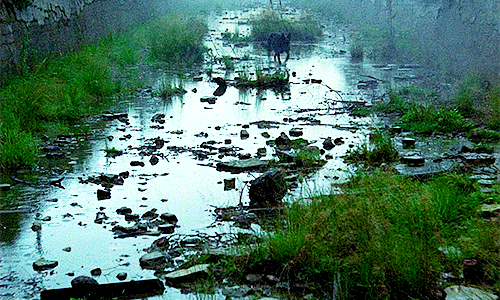

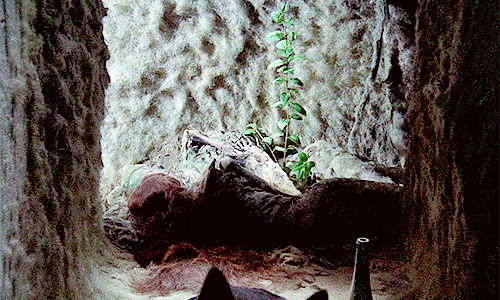
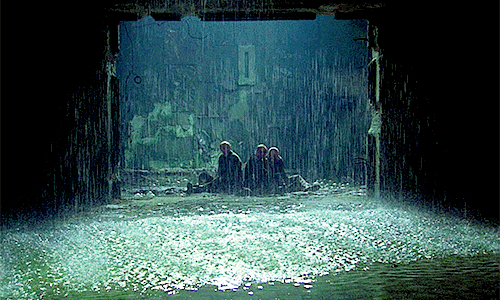
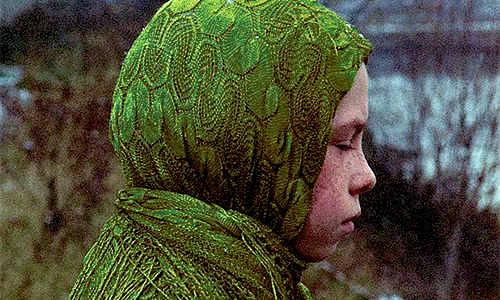
Hardness and strength are death's companions. Flexibility and softness are the embodiment of life. That which has become hard shall not triumph.
FILMS WATCHED IN 2022: STALKER (1979) dir. Andrei Tarkovsky
#films#filmgif#sci fi gifs#sci fi films#sci fi#science fiction#stalker#stalker 1979#anrdei tarkovsky#roadside picnic#strugatsky brothers#strugatsky bros#boris strugatsky#arkady strugatsky#my gif#filmlog
539 notes
·
View notes
Text
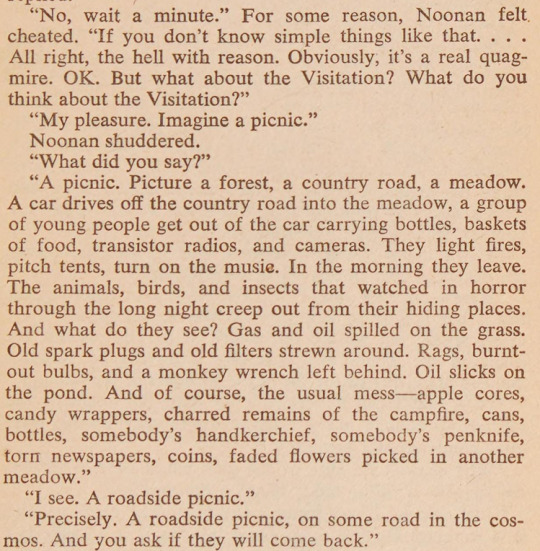
Arkady and Boris Natanovich Strugatsky, "Roadside Picnic"
49 notes
·
View notes
Text

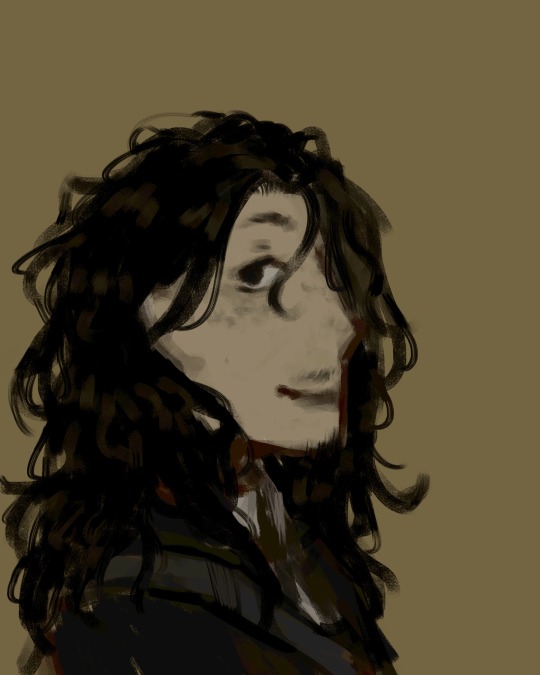
I tried to draw Arthur from Roadside Picnic. How successful? Who knows
#roadside picnic#Arthur Burbridge#Arthur#art#boris strugatsky#arkady strugatsky#strugatsky brothers#stalker
14 notes
·
View notes
Text
[Draft] Why Roadside Picnic is a timeless masterpiece and why everyone missed the point
(DRAFT NOTE: Otherside Picnic and PAFL are tagged because I intended to conclude this essay by explaining why I think those works, ostensibly inspired by R.P., don’t understand and fail to capture what makes the novel so powerful. My writing never got to that point, but it might still be of interest to fans of Otherside Picnic and PAFL, so I’ve kept the tags.
If I ever manage to somehow finish this, I’ll take it down and replace it with the full version.)
ESSAY START:
With that needlessly provocative title out of the way, I hope people are still here and willing to listen as I try to explain myself:
[SPOILERS FOR THE WHOLE BOOK, GO READ IT IF YOU HAVEN’T DONE SO YET]
At its very core, Roadside Picnic is a character study. It acts as philosophical and social commentary too, but a vast majority of that is delivered and explored through Redrick’s character arc.
The sci-fi stuff which everyone loves referencing, and which every adaptation and “inspired” work can’t help but include: the Zone, the artefacts, bolt tossing, Mosquito Manges - none of that matters. You could replace it with magic, or dragons, or some other arbitrary plot device - it just needs to be beyond human understanding and have no clear explanation or origin, to allow for the ideas discussed by Noonan and Dr. Pillman in Chapter 3. This basic premise is all you need to discuss xenology, human psychology, “what’s a rational being”, how insignificant we are in the universe, etc.
All the other details are either little tid-bits of worldbuilding, window-dressing, or serve a specific narrative purpose. Witches’ Jelly could be any “super dangerous substance”, because what matters is not that it eats your bones, what matters is that Redrick sells it to a shady dealer, betraying the morals he espoused in Chapter 1:
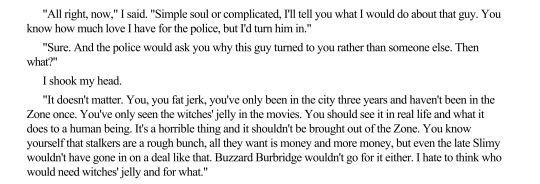
All of these objects aren’t just “cool artefacts”, they’re tools for the Strugatskys to get across their themes.
And those themes are... Well, that’s harder to summarise. The main theme of the story seems to be about how economic circumstances and crises in one’s personal life can rot a person’s moral compass and kill their faith in the possibility of a better world. The events of the story turn someone like Redrick - an honest worker who believes in Kirill’s promises that science has the potential to save humanity - into an evil hypocrite, a murderer who lies to himself to justify his reprehensible actions. The question asked of the audience is “how responsible is Redrick for his own fate”, while the ending asks “will any of it amount to anything”?
To be clear, Redrick is a BAD person. By the end of the book, he has quit his job at the Institute, sold Witches’ Jelly to shady 3rd parties (which ended in a laboratory accident that killed 35), cheated on his wife (with a woman he supposedly despises) and murdered an innocent kid. He even draws sadistic pleasure from the emotional pain he will inflict on Burbridge by killing his son, savouring the irony of Burbridge being the one who kept encouraging him to take some newbie to the Meat Grinder:

But he wasn’t always like this. At the start of the story, he is cynical and rough, but he has principles. Like already mentioned earlier, in the excerpt where Noonan tells him about someone looking to buy Witches’ Jelly, he even goes as far as saying that he’ll work with the police to turn them in. The same police which, earlier in the chapter, stopped him in the street because they profiled him and assumed he was up to something:

Redrick has done his time in prison, gotten an honest job (yes, I know that he says that he still makes "a few bucks on the side”, but he’s actually relieved when he hears they’ll be walling off the Zone because it’ll mean “less temptation”. He wants to make money as a decent citizen), and he’s still being treated like a criminal and stopped by the police on-sight. And despite this, his fear of what the wrong person might do with Witches’ Jelly is so strong, he’s willing to go to them and report the buyer.
And this rejection of his prior Stalker persona is deeper than just getting a job at the institute and being willing to cooperate with police. When Kirill assumes that Redrick suggested getting the Full Empty as a ploy to sell his services, at first, Redrick doesn’t understand what he means. When he does, he feels outright insulted:

When he finds out about Kirill’s death, he is devastated, but notably, this sorrow quickly turns into a hatred of the systems which throw young men to their deaths for money. He curses Ernest for profiting from this exploitation. A key scene is when he hands Creon (a young man who just arrived in Harmont and wants to become a Stalker) a wad of cash and urges him to go back to Malta:

Another pillar of Redrick’s character is the fact that he loves and is loyal to his fiancée, Guta, despite her family being openly antagonistic towards him - not just because of his criminal past, but the fact that he’s been afflicted by the Zone:

He marries her at some point after this.
Most importantly, he actually has a purpose. This is shown when he is pestered by the emigration agent, as he makes a speech about how Harmont is a “hole into the future”, which will change life around the world for the better:
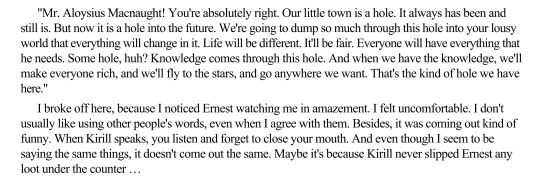
The crucial detail here is that the one who inspired him to think this way is Kirill. Redrick is always portrayed as cynical and bitter, so this high-mindedness is not coming from somewhere within him - it’s external. He’s drawing inspiration from the idealistic, honest people around him. So when Kirill dies, it is not merely the death of a close friend. It is the death of Redrick’s faith, his hope in the future. He even says “How will I get on without you?”:

Basically, Chapter 1 sets-up Redrick AT HIS BEST, so that the story can send him on a downward spiral in every chapter that follows.
Chapter 2 has several important developments, and it marks the start of Redrick’s moral decline. Before getting into that, though, I’d like to draw attention to another part of Redrick’s moral compass which is highlighted - his hatred of Burbridge and, more importantly, his hatred of Burbridge’s daughter, Dina.
Buzzard Burbridge embodies the most reprehensible, slimy aspects of being a Stalker. He is a selfish profiteer, willing to sacrifice his comrades and leave them to die just so he can get away with the loot. Redrick hates Burbridge, and, very importantly, believes himself to be better than Burbridge:

Redrick hates that Burbridge has no regard for human life, and this hatred applies in equal measure to Dina. When Dina tells Redrick that he should have left Buzzard to his death, he slaps her in the face:

This is not done out of sympathy for the man - Redrick hates Burbridge. What insults him is the implication that he should’ve left a comrade to their death - even a piece of sh*t comrade. He hates Dina, because even though what she says about Buzzard is true, it’s not a reason to abandon him to his death. Just like her father, she has no regard for human life.
In this scene, it’s also worth noting that Redrick is very respectful to Hamster. Hamster is the only Stalker to survive entering the Meat Grinder, supposedly saved by Buzzard. He seems to hang around the Burbridge household, possibly acting as some kind of servant, but is deformed and crippled from his injury:

The contrast between how he speaks to Dina and Hamster sends a clear message; Dina’s beauty means nothing. She’s evil, and deserves less respect than ugly, deformed Hamster.
Another key moment is Redrick’s conversation with Noonan in the café near the Métropole hotel. There, we learn why he quit working for the institute; money. He could no longer earn bonuses when expeditions to the Zone began being handled by robots:

Important here is that his salary still isn’t terrible, and the institute did not fire him. He chose to quit, because he wants a sense of freedom, of not being bossed around, and the money to splurge on things (like cigarettes) and have peace of mind. This is aptly summarised in the line “a man needs money so
that he doesn't have to always be counting it”.
Obviously, another reason why he quit is Kirill’s death. In his final, rambling monologue, Redrick admits that he hated working for the Institute, so it’s very likely that Kirill and his idealistic visions for the future were the only things keeping him there.
So, to summarise, at this stage, Redrick’s character looks more or less like this:
1) Wants to do honest work and disassociate from his criminal past.
2) Believes the world can be saved by technology from the Zone.
3) Will never sell Witches’ Jelly to dangerous 3rd parties.
4) Needs money for a basic standard of comfort and freedom from authority.
5) Won’t abandon someone to their death, even someone as bad as Buzzard.
6) Beauty doesn’t matter if, morally, you’re an awful person.
7) Loyal to his wife and daughter.
Having lost Kirill, and with him, his hope for a better future, Redrick’s new source of meaning is his wife and daughter. His purpose in life is providing for them, especially Monkey, whose condition makes her the target of bullying.
(Side note: One thing always annoyed me. Why did they call her Monkey?! That’s asking for people to bully your kid! Was it just a coincidence, or did they really name her after her birth defect? And this is an accurate translation of the Russian “Мартышка”, no weird translation problems here.)
But this new purpose - providing for his family - crashes into him hard when he’s set-up, betrayed, caught by the police, and is forced to flee. It’s then revealed that Redrick had a trump-card up his sleeve - a jar of Witches’ Jelly and an interested buyer, willing to pay the money to his wife in instalments while he rots in prison. It’s never stated how long his prison sentence is, but Redrick estimates that evading arrest (which he did to arrange the transaction) will add another year to it.
To be clear, this jar was prepared as a last resort. He clearly doesn’t want to do this. Earlier, in the Métropole, when he's asked if he managed to procure it, he lies, saying that he didn’t:

He promises to get it later, keeping Throaty interested, but not giving it to him. Later, as he’s about to make the call, he admonishes himself:

This the first major step in Redrick’s decline, where his self-interest explicitly endangers the lives of others, and he still picks himself over others.
Before moving into Chapter 3, one part which I’d like to quickly touch on is the circumstances of Redrick’s arrest. I didn’t pick up on this on my first read, but Ernest wasn’t the one who set-up the police ambush in the Borscht. The one who set up Redrick’s arrest was Richard Noonan:

At first, I was confused as to why Redrick never realised that Noonan betrayed him, but after looking at it more closely, and despite how stupid it may sound, I genuinely think Redrick was so sleep-deprived that he forgot Noonan was the one who told him to drive to the Borscht in the first place. After getting into the cab, he falls asleep and wakes up, incorrectly thinking he told the driver to take him to the bank:

Regardless, in Chapter 3, we learn that Richard Noonan is some sort of government agent, working for the Institute or with law enforcement in some capacity. His mission is to shut down the “flow of materials from the Zone through Harmont”, which is why he has been befriending Stalkers and infiltrating their social circles, monitoring them. His activities include buying artefacts from Stalkers and rerouting them to the Institute:

If you’ve been paying attention, the Stalker which Noonan mentions in the above excerpt, the one he is stringing along and exploiting for his swag, is Creon, the Maltese Stalker which Redrick tried to pay to give up on the profession and go back home in Chapter 1. He persevered, became a successful, and what did it get him? He’s not an adventurer - he’s a pawn, drowning his sorrows in booze, getting closer to death, unaware that he’s being exploited by Noonan.
The worst part of this, which is never said explicitly, but heavily implied, is that the Institute is allowing certain Stalkers to operate because real humans are better, more effective gatherers of artefacts then their officially sanctioned robots. They are supposedly cracking down on this illegal activity, but they don’t mind taking advantage of it while they can:

There’s a sickening duality to it. Officially, Stalkers are criminalised, thrown in jail, ostracised. But behind the scenes, the Institute relies on them to deliver them materials, strings them along and keeps them on their payroll.
(Side note: I’ll let you draw whatever real-life parallels you find applicable. The ones that immediately come to my mind are the US prison-industrial complex and the funding of the the Taliban, but I’m sure you can find many, many more.)
Later, we generally get to see Richard Noonan being a horrid person - beating up a subordinate for having overlooked a group of Stalkers who were sneaking into the Zone without the Institute’s awareness.
Following this, Noonan has his conversation with Valentine Pillman, where the analogy of a “roadside picnic” is used and where the book derives its title. The general message is that we’re completely insignificant. The visitation wasn’t an instance of aliens coming to contact us or conquer us - they were just passing by and accidentally dropped a bunch of their trash on us.
Of course, Pillman qualifies this by saying that this is just his personal theory, and that there is no evidence to support this, or any other interpretation. He points out that to speculate about the motives of non-human beings by applying human psychology to them is folly, and calls xenology a pseudoscience.
For how central this conversation seems to be to the book (it’s in the title, after all), I don’t actually think that it’s a particularly interesting concept. It speaks to a general existential dread many people can probably relate to, being insignificant in the face of the infinitely complex, incomprehensible mechanisms of the cosmos. But it seems quite simple and self-contained, especially compared to the layered, interconnected themes of the rest of the book. It’s quaint.
Much more interesting to me are the things we find out about the artefacts recovered from the Zone. Eternal Batteries, seemingly capable of producing infinite energy, are used to power people’s private cars. Black Sprays, little beads which one theory claims are huge swathes of compressed space, are used to decorate jewelry:
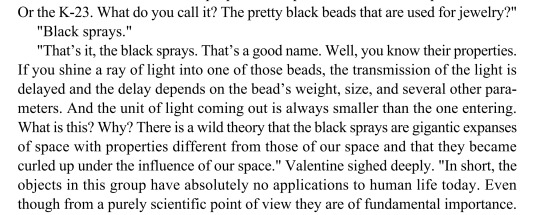
To be blunt, Kirill was wrong. The artefacts from the Zone and the research done by the Institute are not “saving the world”. They’re accomplishing almost nothing. At best, they become the playthings of the wealthy and powerful, while the working class is literally killing themselves in the Zone to acquire them. At worst, they’re causing horrible accidents and killing people, like the Currigan labs incident:
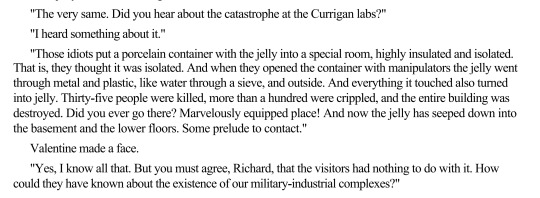
The point of this is to show that fancy new technology does not inherently uproot old systems of injustice and exploitation. Without societal change, even something as reality-shattering as an alien invasion will be slotted into the old way of things. There’s even a passing mention of more luxury accommodations being built in Harmont in response to... tourists:

I saw another Tumblr post tagged with #roadside picnic, complaining about how people are trying too hard to make every soviet novel into something political. Well, I’m sorry. IT IS POLITICAL. You’re just not paying attention. If you disagree, I challenge you to read the above passage about “the suburbs being emptied” and tell me that it’s not trying to communicate anything about the economical systems ruling Harmont.
And if I need to spell it out, the force consuming and destroying the lives of Stalkers is not “the Zone”. It’s capitalism. The characters constantly talk about greenbacks, about needing money. The reason Stalkers need to break the law and risk their lives is either because they have rent to pay, or because they want to become financially stable enough to be free from the coercion of bosses and landlords.
The entire reason Redrick betrays his moral convictions in Chapter 2 is because of money. He leaves the Institute because his job is being automated, his pay is being cut, and he doesn’t want to live paycheck to paycheck. He wants to be free. And finally, he sells the Witches’ Jelly because he has to keep his family fed while he’s stuck in jail.
And if you still think I’m just reading too much into things, seeing what I want to see, I’d like to take you back to Chapter 2 for a few notable passages. Namely, Redrick’s experiences as he is entering the luxury hotel, Métropole:

This is Redrick, talking to a cop. Yes, the police, so eager to harass him in Chapter 1, are suddenly asking him if he’s alright, offering to help, calling him “mister”. So what changed?
Well, he is wearing a suit, holding a suitcase, standing in front of a fancy hotel. They assumed he’s rich. That he’s a respectable citizen, that he’d never need to steal anything.
There’s a genius reversal here - in Chapter 1, Redrick was an honest lab worker, but was profiled and stopped by the police. In Chapter 2, while the cop is trying to help him, he’s on his way to an illegal deal with a suitcase full of contraband. He’s an actual criminal, but he’s treated with kindness, because he looks upper-class.
And if you still somehow think this is all a coincidence, I ask you - why is this scene here? Why was it written? Seriously, it’s such a random moment, a complete non-sequiteur from everything happening beforehand, and I never hear anyone talk about it. Redrick, out of nowhere, begins having strong hallucinations and has to stop to catch his breath. If the key information being conveyed here is “Redrick suffers from hallucinations”, why not just have him catch his breath and move on? Why add this random cop, trying so hard to be helpful?
The answer is simple. It’s not a “random cop”. It’s social commentary on how cops exist to protect and serve the ruling class.
In the hotel itself, we have this moment where Redrick steps into an elevator full of absurdly, comically obnoxious rich people:

If you’ve been ignoring the attached excerpts so far, I urge you to read this one. I cannot adequately summarise how seeping with contempt and revulsion these descriptions are. Redrick closes his eyes to try to “shut out” these people, to not have to look at them. The young boy is eating chocolate, of course, drooling, while his mother has the Black Sprays we talked about earlier on her necklace. This is the privileged, wealthy elite and Redrick HATES them and what they represent. It’s textbook class antagonism.
And this doesn’t just affect Redrick. Returning to Chapter 3, Noonan visits Redrick’s house and speaks to Guta, who tells him about their struggles with Monkey, whose condition had worsened, destroying most of her cognitive abilities:
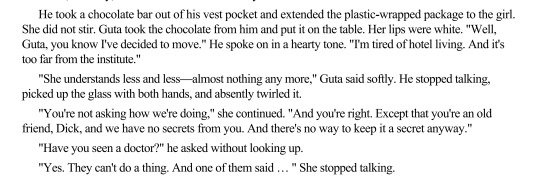
Noonan is wealthy. He’s one of the people who uses a car powered by an Eternal Battery. He lives in hotels. But more importantly:

Noonan genuinely sympathises with Redrick and Guta’s plight, and the suffering they’re going through because of Monkey’s condition. He genuinely wants to help them, and is ready to, but then remembers his boss. He remembers that his job is not to help the ones who are struggling and need it the most, but to serve the system. To label these people criminals and “infiltrate” them, monitor them, instead of simply befriending them.
Of course, Richard Noonan is an awful person. But we're almost given the sense that, given his position, he doesn’t even have an opportunity to be a good, honest person. When he genuinely feels sympathy for those he exploits, he forces himself to stop and suppresses his good nature. Because that’s what’s expected of him, what his job requires. He’s there to protect the interests of the Institute - the ruling class.
I really hope these examples adequately demonstrate what I believe to be the main political themes of the story, because I’m going to put those aside for a moment and go back to the personal, moral journey of the main character.
The only thing of note left in Chapter 3 is Redrick’s father and his reaction to news of the lab accident.
[UNIFNISHED DRAFT ENDS HERE]
(TRANSLATION NOTE: All quotations are taken from the Antonina W. Bouis translation, despite there being an arguably more accurate translation by Olena Bormashenko. This is out of habit, not preference - I’m more familiar with the Bouis translation, which made searching for quotes easier.)
(Huge thanks to Antonina W. Bouis and later Olena Bormashenko for bringing this book to an anglophone audience, to Irena Lewandowska and Rafał Dębski for translating it to Polish, and to Siergiej Rajkov and Milan Asadurov for doing the same in Bulgarian.)
#roadside picnic#stalker#otherside picnic#parties are for losers#book analysis#strugatsky brothers#My writing
120 notes
·
View notes
Text
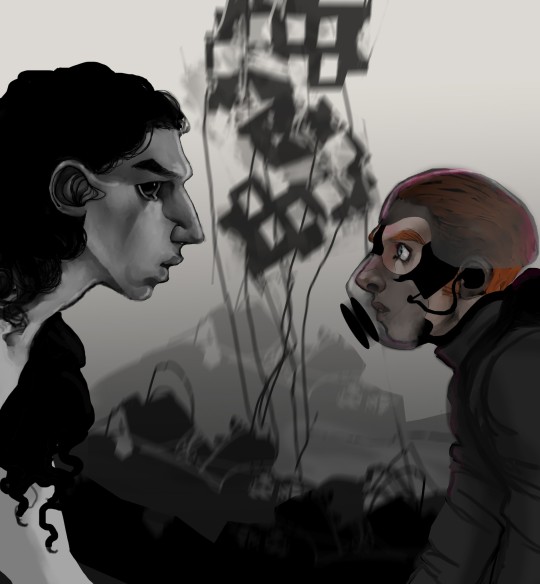
Zone
#star wars#my art#general hux#kylo ren#kylux#armitage hux#ben solo#strugatsky brothers#roadside picnic
97 notes
·
View notes
Photo
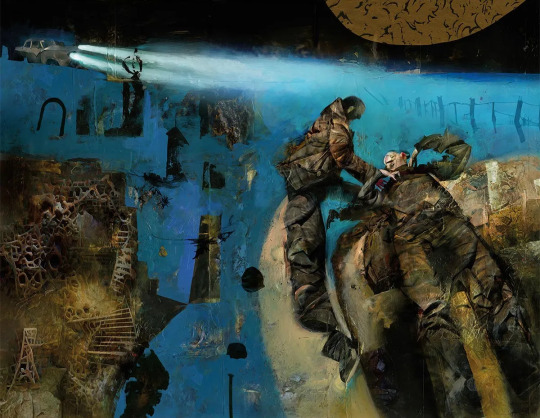
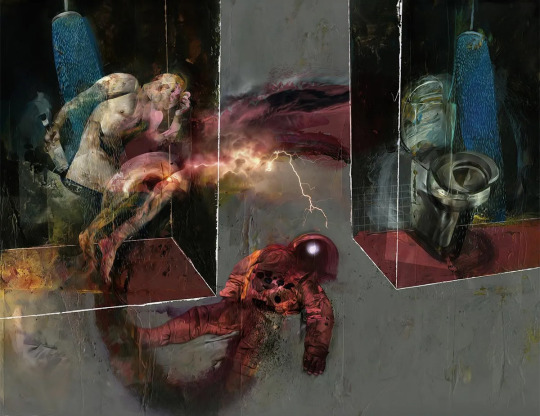
Dave McKean’s illustrations for Arkady & Boris Strugatsky‘s Roadside Picnic.
#dave mckean#arkady strugatsky#boris strugatsky#strugatsky brothers#roadside picnic#russian literature
192 notes
·
View notes
Text

“Let everything that’s been planned come true. Let them believe. And let them have a laugh at their passions. Because what they call passion actually is not some emotional energy, but just the friction between their souls and the outside world. And most important, let them believe in themselves. Let them be helpless like children, because weakness is a great thing, and strength is nothing. When a man is just born, he is weak and flexible. When he dies, he is hard and insensitive. When a tree is growing, it’s tender and pliant. But when it’s dry and hard, it dies. Hardness and strength are death’s companions. Pliancy and weakness are expressions of the freshness of being. Because what has hardened will never win.”

Stalker (1979, dir. Andrei Tarkovsky)
35 notes
·
View notes
Text


I have a type,
and it's gods that cry themselves to sleep every night because of their paralyzing sense of powerlessness.
#here's to me trying to draw more than last year *clink*🥂 first art of the year#here's also to my art getting hornier with each passing year *clink*🥂#tears and no tears variant cuz I liked the one without them also#don rumata#hard to be a god#strugatsky brothers#my fan art
36 notes
·
View notes
Text
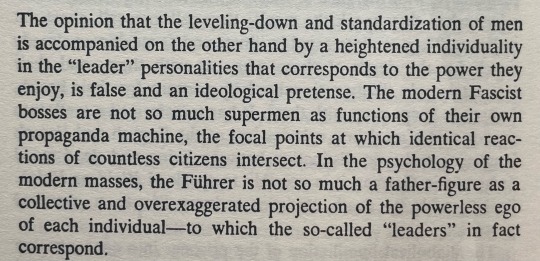
Theodor Adorno and Max Horkheimer, The Dialectic of Enlightenment

Arkady and Boris Strugatsky, Hard to Be a God
11 notes
·
View notes